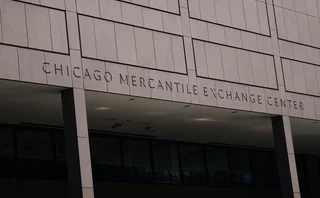
Profile: Citadel's Hamill on the fight for swaps market share
The arrival of swap execution facilities was supposed to herald a new era of swap market competition. Citadel Securities was the first new entrant to take the challenge, and its fixed-income execution head talks here about how the firm is trying to make its mark

Users of swap trading platforms run by Bloomberg and Tradeweb saw a new four-letter broker code appear on their screens on October 27 last year – CTSD. It signalled the arrival of a new liquidity provider and the start of what could be a defining tussle for the swaps market.
The code stands for Citadel Securities – the market-making arm of the Chicago-based firm – but, until now, Citadel has not been shouting about it. There has been little active marketing, there have been no glossy ads, no slick pitches at industry conferences. That is all to come, and it will focus relentlessly on what the firm thinks is its edge.
"We have taken a different approach to our swap business from the traditional bank model; We are not leading with a bundled approach via research, high-touch sales coverage or prime services – we know we need to earn customer business through being incrementally better at certain aspects of this product," says Paul Hamill, the firm's global head of fixed income, currencies and commodities for execution services.
The cover of an as-yet-unreleased marketing brochure offers a clue as to what those aspects might be: "Firm. Efficient. Always there," it says. Inside, Citadel lists the achievements racked up during the short life of its swaps business: since going live at the end of October, it is in the top five on Bloomberg's swap execution facility (Sef) in terms of both number of trades and size of notional executed, number one in hit ratio and number one in response times.
Hamill attributes this to the quantitative analytics underpinning Citadel's prices. The firm's trades are also executed and – for the most part – hedged automatically. He claims that, as a result, prices are tighter, more reliable, and response times are shorter.
We focus on ensuring that the price customers see on the screen is the one they get when they go to execute
"We focus on ensuring that the price customers see on the screen is the one they get when they go to execute. Historically, clients have found it frustrating when they select a bank based on what's on the screen, but when they go through to execute via RFQ, the price moves away," he says.
Reliability, tight prices and speed
The firm's arrival as a provider of swap liquidity to clients is only possible because Sefs are required by law to be open to all participants, and all Sef-executed trades have to be cleared – removing the requirement to accept years of counterparty credit risk with each new trade. It sets up a clash of business model – between Citadel, which is basing its pitch on the classic market-making virtues of reliability, tight prices and speed – and traditional dealers, which have deeper relationships with clients.
Most of these dealers are currently trading with some degree of manual involvement, Hamill claims, and stats from the platforms seem to confirm it.
Citadel's average response time to quote requests on Bloomberg is 0.35 seconds – illustrated in the marketing brochure via a screenshot. The nearest rival among 19 other liquidity providers is around two seconds, and the average is five seconds. In total, only seven houses are responding in less than four seconds on average, and six of them take more than seven seconds.
"What can be happening in that scenario on a traditional dealing desk is the trader's looking at the client, available hedging liquidity, and deciding whether to move the price accordingly," says Hamill.
There is also no argument that CTSD is offering tighter prices. Hamill says the firm is generally quoting between 0.2 and 0.25 of a basis point for a 10-year US dollar interest rate swap in notional sizes of up to $60 million – the typical social size for on-screen trades – but prices can be as tight as 0.1 or as wide as 0.3 for larger sizes. The full bid/offer spread for the average bank is typically closer to 0.4 or 0.5 for comparable trades, he claims.
Four rival dealers broadly corroborate those claims. The question – for potential clients as well as rivals – is whether Citadel can keep that up.
"They're quoting razor-thin spreads. There's no way they can make money at those levels," says a senior e-trading executive at one European bank.
Hamill denies that: "Are we loss-leading? Not at all – our cost structure and model ensure we can operate a profitable business with prices at these levels. Feedback from clients is that those happen to be tighter than everyone else's, but that reflects our different cost base relative to other liquidity providers and the automated approach to delivering our model."
Other banks cite their broader offerings and relationships as a reason not to fear the new entrant. "Citadel has not impacted us in the least. When we service customers, it's a more holistic approach – a full-service proposition, with research and market colour. It is a much broader service than liquidity online," says one dealer's e-trading head.
Limited appeal?
The head of European rates trading at a third dealer predicts Citadel's appeal will be limited: "We don't think they've penetrated into the genuine client base. So far, their clients are the kind of players that trade a lot and primarily care about price – I don't think they have broken into the bigger group of firms that have other needs," he says.
A senior fixed-income source at a fourth bank takes a similar line. He claims his employer could quote closer to Citadel's spreads and still make money, but says it doesn't need to.
"At three-tenths, we would at least break even. We do business at our spreads because we have clients that want to do business with us. If Citadel's client business is successful, then they'll have clients that want to do business with them there," he says.
In all, Hamill says Citadel has received quote requests - the dominant mode of Sef trading between dealers and clients – from 90 firms, while the established players might be receiving enquiries from 300 or more accounts
He says Citadel can go further: "We have a lot of work to do as we reach more clients, but for four months in, we're very pleased with the results, the volumes and the lessons we're learning."
And it's not just about price, he argues. On the days when key US employment figures are published, Hamill says Citadel has been seeing a wider cover ratio – the gap between its price and the second-best price on trades it wins.
 "Where our model is clearly extremely valuable to clients is during market volatility. For example, during non-farm payrolls we stay on the screen and we stay tight. That is clearly different to many of our competitors, because we see our cover prices widen out significantly during these times, indicating that during volatile periods a lot of quotes get much wider or fall away," he says.
"Where our model is clearly extremely valuable to clients is during market volatility. For example, during non-farm payrolls we stay on the screen and we stay tight. That is clearly different to many of our competitors, because we see our cover prices widen out significantly during these times, indicating that during volatile periods a lot of quotes get much wider or fall away," he says.
Hamill credits colleague Yanfeng Chen – an April 2014 hire from Credit Suisse – for Citadel's pricing: "He was here for many, many months before me, building and calibrating the risk and hedging models and getting the operational and connectivity aspects set up right. He is very well respected as a practitioner, with a deep understanding of how the market works and has traded it for many years. We have similarly experienced quants and IT resources around that."
So, how is the firm auto-hedging its swaps business? It's a step other dealers have been considering, as the market becomes increasingly electronic, but for most it remains no more than an aspiration. Hamill says this is part of Citadel's secret sauce: "Our hedging model is a core competitive advantage. We have not found some uniquely correlated instrument that no-one else has discovered, but by doing this electronically and in quantitatively driven ways, we can be intelligent and efficient about it."
Currently, not all of the firm's risk is being hedged automatically – some is still manual – but Hamill says the intent is to get as close as possible to 100% over time.
Another sensitive question relates to clearing. All trades that are subject to the Sef mandate also have to go to a central counterparty (CCP), so Citadel will either need to join CCPs as a member – which comes with some added costs and responsibilities – or will have to be a client of one or more futures commission merchants (FCMs), which provide CCP access on an agency basis. A danger with the latter is that all swap FCMs are currently run by the same banks with which Citadel is now competing as a market-maker. It is an obvious way in which the incumbents could squeeze their rival, by restricting its trading capacity, and one e-commerce specialist at a European dealer predicts this is exactly what will happen if Citadel becomes too successful.
Hamill confirms Citadel Securities is currently a clearing client – he declines to say how many FCMs the firm uses, or to name them – but says the firm will continue to evaluate self clearing: "We like to keep our options open, and will leverage our substantial existing self-clearing capabilities in other products, should we decide it makes economic sense to take that route," he says.
So, can Citadel go the distance? Michael O'Brien, global head of trading with Eaton Vance in Boston, thinks so: "I hope it's sustainable. Across a lot of different asset classes, we've seen people come in, make a big splash with really tight prices that were unsustainable and eventually fade away over time. Based on the people I know at Citadel, I don't think they're going to do that."
Only users who have a paid subscription or are part of a corporate subscription are able to print or copy content.
To access these options, along with all other subscription benefits, please contact info@risk.net or view our subscription options here: http://subscriptions.risk.net/subscribe
You are currently unable to print this content. Please contact info@risk.net to find out more.
You are currently unable to copy this content. Please contact info@risk.net to find out more.
Copyright Infopro Digital Limited. All rights reserved.
As outlined in our terms and conditions, https://www.infopro-digital.com/terms-and-conditions/subscriptions/ (point 2.4), printing is limited to a single copy.
If you would like to purchase additional rights please email info@risk.net
Copyright Infopro Digital Limited. All rights reserved.
You may share this content using our article tools. As outlined in our terms and conditions, https://www.infopro-digital.com/terms-and-conditions/subscriptions/ (clause 2.4), an Authorised User may only make one copy of the materials for their own personal use. You must also comply with the restrictions in clause 2.5.
If you would like to purchase additional rights please email info@risk.net
More on Interest rate markets
Sharper economic picture sets scene for dollar swaps rebound
Razor-thin bid/offer spreads and slim post-April trading volumes give way to an uptick in August
New benchmark to give Philippine peso swaps a fillip, post-Isda add
Isda to include new PHP overnight rate and Indonesia’s Indonia in its next definitions update
SABR convexity adjustment for an arithmetic average RFR swap
A model-independent convexity adjustment for interest rate swaps is introduced
NatWest Securities US Treasury trading head departs
Jason Sable joined the UK bank in January 2022 from BNP Paribas
CME in talks to clear term SOFR basis swaps
US clearing house has held discussions with some dealers about clearing term SOFR-SOFR packages
Risky caplet pricing with backward-looking rates
The Hull-White model for short rates is extended to include compounded rates and credit risk
The curious case of backward short rates
A discretisation approach for both backward- and forward-looking interest rate derivatives is proposed
Cross-currency swaps will use RFRs on both legs, says JP exec
Despite slow start, all-RFR swaps will become the market standard within a year, according to Tom Prickett








